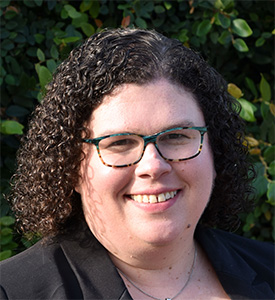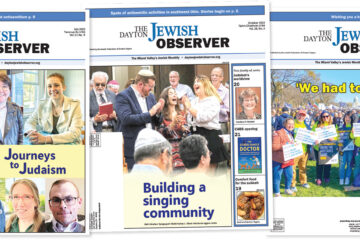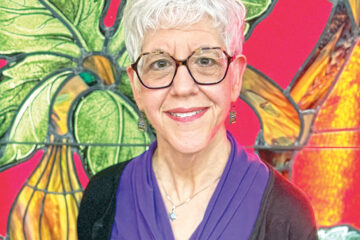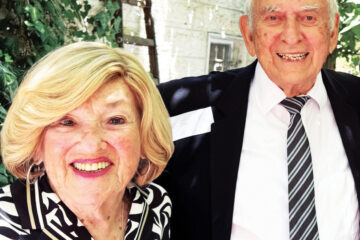UD adds second Judaic studies scholar to religion faculty

An interview with Asst. Prof. of Hebrew Bible Esther Brownsmith
By Marshall Weiss, The Dayton Jewish Observer
With the beginning of the fall term, the University of Dayton now has two full-time Judaic studies scholars in its religious studies department.
Assistant Prof. of Hebrew Bible Esther Brownsmith has arrived from Oslo, Norway, where she completed her postdoctoral research at the MF Norwegian School of Theology, Religion and Society. She received her Ph.D. in Bible and Ancient Near East from Brandeis University in 2020 and her master’s degree in religion with a concentration on Hebrew Bible from Yale Divinity School in 2009.
She joins Judaic Studies Assistant Prof. Abraham Rubin in the religion department; Rubin began teaching at UD last fall. (A third Judaic studies scholar, Prof. Miriamne Krummel, is with UD’s English department.)
“She’s a versatile and engaging teacher,” Rubin says of Brownsmith. “Biblical poetry is not the most accessible genre. In one of her demo lectures for the faculty, Esther guided us through a passage in the Song of Deborah from the Book of Judges that really brought the text to life in all its complexity and beauty.”
An Episcopalian, Brownsmith describes herself as “a Christian with a Jewish family heritage.” Her maternal grandparents, Polish Jews, escaped the Holocaust and settled in England.
Here, she talks about her path to Hebrew Bible scholarship, how her Jewish lineage informs her work, and what she hopes to accomplish at UD.
Where are you originally from?
I grew up mostly in Florida. We actually lived in Israel for a couple of years when I was very young. My parents met when they were both in Israel, and they’re citizens. So they went back for a few years when I was young. My dad is, by training an electrical engineer, by application, more of a software programmer. My mom is an anesthesiologist. She’s been a general M.D.
What was their second job for many years — and what I think is going to be their legacy — they were the creators of Accordance Bible Software. It’s one of the really standard pieces of software that you use for doing biblical exegesis. For them, it was their calling. Their passion. It was a space they saw that they could fill. And so, in some ways, I’m kind of in the family business by getting into biblical studies.
My mom’s parents were both Polish Jews. They made it out just before things got locked down and Jews couldn’t make it out. When they settled down and started to have kids after the war, they decided that they would just not tell their children they were Jewish. They would keep it a family secret. They (their children) suspected something was up: parents who émigrated from Poland, distant family relatives who live in Israel. They didn’t raise them particularly religious in any sense. But as a teenager, my mom did decide to become a Christian. But she was always interested in her personal heritage, so she went and ended up getting a job as a doctor in Israel, which was where she met my dad (also a Christian), after living there for several years.
It feels like it’s more than a parent with Jewish lineage. But it’s hard to get the words for what the more than that is. When people ask me what’s your religious background, my shorthand answer is, ‘It’s complicated.’
How did you get into your field?
I had a great professor of Hebrew Bible (as an undergrad) at Rice University. I just really, really enjoyed getting into those texts. I really love Hebrew as a language. The way it communicates ideas feels poetic to me. The ambiguities of its grammatical system, the roots that it has in all the allusions of semitic languages, and the way that we’re often kind of reconstructing it.
OK, we probably know what that word over there means because of the context, but what were its connotations? What did it make people think of when they heard it or when they wrote it? It’s really just a lovely combination of intellectually satisfying and fascinating, but also particularly resonant and meaningful.
One of the classes I’m teaching is on The Pentateuch. One of the things that I’m going to be emphasizing with them is the way that the Pentateuch is in many ways a Bible within a Bible. That’s the (Torah) scroll that you take around the synagogue, that’s the text that you see cited and quoted and commented on.
The Hebrew Bible is this text that is fascinating in itself but also has so much resonance in Christianity and Islam and other ancient religions like Manichaeism and Gnosticism. All of these different faiths look to the Hebrew Bible as a source of stories and knowledge, and wisdom.
And so, to be able to go back to it and understand it, and specifically in many cases, to change people’s assumptions about it is something that I really feel called toward. I feel like in many ways, the mixed religious heritage that I have has given me both insight into Christianity but also a step away from it to be able to look critically at some of the ways that it treats many issues — Judaism being one of them and sexuality and gender being another — in ways that I’d like to help deconstruct a little bit.
What led you to Brandeis?
They have a fantastic reputation for really intense philological (language) study. I took years of Akkadian. I took Phoenician, I took Hittite for a semester. And of course, plenty of Hebrew classes as well.
I ended up doing my dissertation on the Hebrew Bible in particular, looking at so-called texts of terror, texts of violence against women and analyzing them through the lens of metaphor theory. I argued that these stories about women that I was looking at were setting the women up as something consumable, as food.
And at some point, you began researching your namesake, Esther.
It started with a paper that I gave at an international conference several years ago now, where they had opened up a panel on fan fiction. I decided to submit a paper pertaining to the books of Esther and Daniel. Both of them are kind of famously known for the fact that in addition to being late texts and in addition to many similarities, their namesakes appear elsewhere.
Daniel is also the name of a hero in Ugaritic mythology, who is a wise, godly figure. And Ishtar and Marduke, Esther and Mordechai, are two of the main deities in Mesopotamia.
And so, I took those namesakes and basically argued what these texts are doing is something like fan fiction. They’re taking these existing figures but saying, what if we reimagined them as Jews? What if we imagined them in our social setting as figures that we look up to and empathize with? I had to set it aside, worked on my dissertation, which is coming out as a book.
In Norway, I started out with the plan of working on a book that would have a chapter on Esther, a chapter on Asenath (Joseph’s wife), other examples. But then I started on Esther and the deeper I got into the book, the more I was like, this is really good on its own, there’s just too much there. The book is partially written.
There’s a chapter on affect theory, looking at how emotions work in the Book of Esther and in fan fiction, a genre that kind of springs from emotional feelings.
There’s a chapter on canon and the question of Esther’s kind of shaky relationship with canon, where people have tried to nudge it out several times, but it never quite gets out, and why is it in the canon and how does it see itself in relationship to the canon? Canon is a major theme in fan fiction as well.
And then I have a chapter on queerness in the Book of Esther and in fan fiction, which is one of the areas that people don’t talk a lot about when they’re applying fan fiction to the ancient world.
What specifically brought you to this position with UD?
I didn’t expect to end up at a Catholic university. I’m not Catholic in any way in my religion or my heritage. I put in my job application because they were hiring for Hebrew Bible and there are just not a lot of Hebrew Bible jobs out in the world.
From the first interview, I was really, really struck by their warmth, by their genuineness, by the way that they really do value both teaching and research, that neither of those is left on its own.
At the end of my first Zoom interview, my two questions were, number one, you’re advertising for Hebrew Bible, not Old Testament, which for a Christian-heritage university is a little unusual. Tell me about that.
And they emphasized that yes, it was a very deliberate choice and that they are looking for this not as the Bible through the lens of Christianity, but as the Hebrew Bible in itself and then also its heritage and all the different religions that have drawn from it, but that they were serious about that.
And my second question was, I do queer theory, I do gender theory. Is that going to be welcome at a Catholic university? And again, they were just overwhelmingly supportive. They were positive about that.
You’re a member of the Association of Jewish Studies. Is it fairly common to have Judaic studies scholars who aren’t Jewish?
Certainly, the majority of people there are. Because if you’re getting into Jewish studies, you probably have a reason for it. But I’m also definitely not the only person there who isn’t strictly just Jewish.
What do you hope to accomplish in your role at UD?
The two things that I would love to see even more so, which is not to say there aren’t other faculty working on this, are number one, making sure that all students — Christian, Muslim, Jewish, gay, straight, trans, etc. — feel like they are welcome, not just at UD as the university, but specifically as people who are allowed to think about religion.
And simultaneously, especially with classes like The Pentateuch, I want students to feel a little bit of the love that I have for the Bible. And to see it as a text that captures so much of humanity in it. Of human struggles, and thoughts, and beauty, and fears. And something that has value to think about even if what it means to some of us today may be very different from what it meant to other people in the past. That there’s still value in reading it, in listening to it.
I’ve had a lot of fun designing these courses, and I’m just really hoping that the students can capture a little of that excitement themselves.
To read the complete September 2023 Dayton Jewish Observer, click here.





